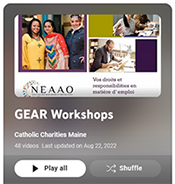 The Office for Maine Refugee Services (OMRS) manages federal funding from the Office of Refugee Resettlement (ORR), a department of the U.S. Health and Human Services. Grant funds are sub-awarded to partners across the state for a variety of programs and services. OMRS partners with resettlement agencies, health providers, school districts, community colleges and social service providers to offer comprehensive programming to the newly arrived refugee population in Maine. Programs range from employment services and English language training to health screenings and emotional wellness services to specialized programs for youth and elderly. While the most intense services are offered during the first year after arrival, refugees are eligible for the majority of OMRS-funded programs up to five years after their arrival in the United States.
The Office for Maine Refugee Services (OMRS) manages federal funding from the Office of Refugee Resettlement (ORR), a department of the U.S. Health and Human Services. Grant funds are sub-awarded to partners across the state for a variety of programs and services. OMRS partners with resettlement agencies, health providers, school districts, community colleges and social service providers to offer comprehensive programming to the newly arrived refugee population in Maine. Programs range from employment services and English language training to health screenings and emotional wellness services to specialized programs for youth and elderly. While the most intense services are offered during the first year after arrival, refugees are eligible for the majority of OMRS-funded programs up to five years after their arrival in the United States.
Refugee Cash Assistance (RCA) is available for persons ineligible for federal cash assistance such as Temporary Assistance for Needy Families (TANF) or Social Security Income (SSI), which is typically those without minor children and Senior citizens 65+ year old. RCA is an employment-based program that can assist refugees financially while they are attending English language classes and searching for their first job in the Unites States. RCA is available for a maximum of only 4 months after a refugee arrives in the United States. Recipients become ineligible when they reach 150% of the federal poverty level or if they are past their 4th month in the states, whichever comes first.
For more information about the program and eligibility, please refer to the The 45 CFR 400. The Office of Maine Refugee Services administers the RCA and TANF Differential programs. All Resettlement agencies in the state are required to refer ORR eligible population to OMRS RCA/RMA Eligibility Coordinator by filling out an OMRS Referral Form found under the resource menu and emailing it to Goreth at gingabire@ccmaine.org with all the eligibility documents.
Refugees resettled in Maine are eligible to receive a Refugee Health Assessment (RHA), a comprehensive exam specific to the needs of the refugee population. RHAs are provided by trained medical providers within the first 30 to 90 days after refugees’ arrival in Maine. The purpose of the assessment is to ensure follow-up of any conditions identified during the overseas medical examination, to identify any conditions of public health concern, and to identify and treat health conditions that may adversely affect resettlement and early employment. The assessment includes presumptive parasitic treatment, immunizations, mental health screening, and identification of disease pathology or impaired nutritional status. Refugees are also referred to a primary care physician to establish care after completing the health assessment process. During the assessment and throughout the resettlement process and cultural orientations, refugees receive health education to learn about the U.S. healthcare system, including the importance of primary care, insurance, prescriptions, and levels of care. Adults and children receive adjustment of status vaccinations in line with ACIP recommendations.
All local medical screening providers should provide refugees with latent tuberculosis treatment, which are provided to the general public as needed after the TB screening.
As of today’s date, the Office of Maine Refugee Services through the State Refugee Health Coordinator has established refugee medical screening contracts with seven (07) providers across the state. Those providers conduct the domestic refugee medical screening as described in State Letter # 12 - 09, State Letter # 23-08, and the CDC Refugee Health Guidance. All providers are required to conduct the screening using the attached Maine Refugee Health Assessment tool.
Refugee Health Assessment and Immunization Partners:
Interested in becoming a Refugee Medical Screening Partner? Please fill the Apply for Funding form below.
The goal of the RHP program is to promote the health and well-being of refugees and other ORR-eligible populations by:
1) providing opportunities to increase health literacy,
2) coordinating health care, and
3) organizing wellness groups.
To accomplish this goal, ORR encourages involvement of the Refugee Health Coordinator (RHC) to ensure a coordinated approach for the planning, implementation, and monitoring of RHP activities.
The RHP program should focus on providing direct services for ORR-eligible populations to promote their health, both routinely and during time of crisis (e.g., pandemics). Activities may include:
Grantees must follow these guidelines when implementing these RHP activities.
We engage Ethnic Community Based Organizations’ (ECBO) partnership and refugee leaders in cross-cultural trainings and interventions culturally adapted to refugee communities.
OMRS uses the RHP grant to funds health promotion activities from ECBOs, immigrant organizations, resettlement agencies, and mental health care providers. For more information about the refugee health promotion program, please reach out to Breeana Blalock, State Refugee Health Promotion Program Coordinator at bblalock@ccmaine.org. You may also find more information about the RHP program here RHP Policy.
Funded Partners:
Fill the form below if you are interested in applying for the RHP funding.
Fill out this easy-to-use form to begin the process of applying for Federal Funding to support your service to our refugee communities.
The Refugee Social Services (RSS) Program supports services that address barriers to employment and self-sufficiency. Refugees are eligible to participate in RSS funded services up to 5 years from date of arrival. The majority of the programs offered are targeted toward refugees who have been in the U.S. for less than one year. Services include:
The refugee resettlement agencies in Maine provide most of the Refugee Social Services programming. English Language Training is offered by Adult Education providers, Universities and Colleges. OMRS can also sponsor English literacy classes organized by community-based organizations.
The Office of Maine Refugee Services refer all qualified RCA recipients to the 3 resettlement agencies in the state to provide this service. Some clients may walk in or may be referred for these services by other sources. All three resettlement agencies received funding from OMRS to provide this important service.
Anyone interested in refugee support services can access it at:
Ethnic Community Based Organizations and Adult Ed providers may apply for funding to provide English literacy classes to ORR eligible populations. For more information about the RSS program, please click HERE or go to CFR 400 Refugee Social Services.
Fill out this easy-to-use form to begin the process of applying for Federal Funding to support your service to our refugee communities.
The Services to Older Refugees Program funds states and state-alternative programs to ensure that refugees aged 60 and older have access to applicable services for the aging and to provide qualifying refugees with appropriate services not currently available in the community.
Refugees aged 60 and above who have been in the United States for up to 5 years are eligible for all program services. Referral services, interpreter services, and citizenship and naturalization preparation services for these refugees are available beyond the five-year mark.
Example of Services to Older Refugees are:
These activities, services, and resources support overall physical and emotional health, help integration into new communities, and support independent living.
Catholic Charities Refugee and Immigration Services (RIS) is the sole recipient of the Maine SOR grants. All refugees/ORR eligible population members aged 60 and older should be referred to RIS at 80 Sherman Street Portland ME to benefit from this service.
More information about this funding and program can be found here.
Fill out this easy-to-use form to begin the process of applying for Federal Funding to support your service to our refugee communities.
The Refugee School Impact Grant is designed to address the language, academic, and cultural adjustment needs of newly arrived refugee youth. Maine school districts with refugee students should use this funding to provide out-of-school time programming, specialized classroom learning materials, bilingual and culturally competent support staff, parent engagement activities, and comprehensive school intake and orientation processes.
OMRS encourages all school districts with newly arrived refugees to reach out to us for further discussion on how to leverage this resource. Based on resettlement data, OMRS identifies areas of the state with high refugee youth concentration and invite the school administrators from those areas to apply for the State of Maine RSIG funds. For more information about the RSIG program, click on this LINK
Current funded school departments are:
Fill out this easy-to-use form to begin the process of applying for Federal Funding to support your service to our refugee communities.
Funded Partners:
TBD
The Youth Mentoring Program matches refugee youth between the ages of 15 and 24 with mentors who will support successful integration, promote positive civic and social engagement, and support educational and career development. This program is open to youth within the first five years of their arrival. Gateway Community Services and Maine Immigrant and Refugee Services administer the Youth Mentoring program in Maine.
Fill out this easy-to-use form to begin the process of applying for Federal Funding to support your service to our refugee communities.
The Wilson-Fish (WF) Temporary Assistance for Needy Families (TANF) Coordination Program (WF TCP) funds innovative approaches to provide more customized, culturally, and linguistically appropriate integrated services and resources for ORR-eligible families with children under the age of 18. The goal of WF TCP is to strengthen these families’ abilities to navigate barriers, become economically self-sufficient, and improve their social and economic wellbeing.
Maine coordinates with the state TANF office, the State Refugee Coordinator, and other relevant stakeholders to map existing services and resources. The WF-TCP in Maine is run by the Growing Employment Access for Refugees (GEAR) team hosted at the Office of Maine Refugee Services. The GEAR team develops resources and provide in-person and remote support to enhance or complement existing programming, and/or address unmet needs of families.
All ORR-eligible individuals can receive WF TCP services for up to three years from their date of eligibility. However, grantees prioritize families with children under the age of 18, who may be eligible for TANF and who are within their first year of ORR eligibility, as well as those not receiving other enhanced services who require additional support.
OMRS’ GEAR (Growing Employment Access for Refugees) project provides customized, culturally and linguistically appropriate services for TANF refugee recipients to improve their participation in ASPIRE activities.
 Please visit our YouTube channel for our library of employment videos in multiple languages.
Please visit our YouTube channel for our library of employment videos in multiple languages.
For more information about the program in the state of Maine, please contact Michele Kouanzoua at MKouanzoua@ccmaine.org.
Fill out this easy-to-use form to begin the process of applying for Federal Funding to support your service to our refugee communities.
Fill out this easy-to-use form to begin the process of applying for Federal Funding to support your service to our refugee communities.